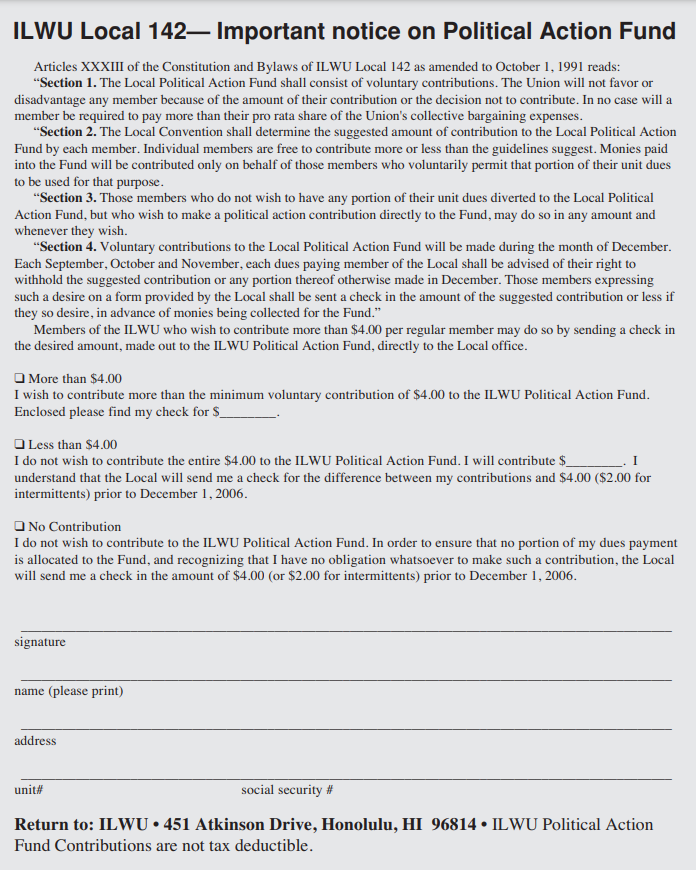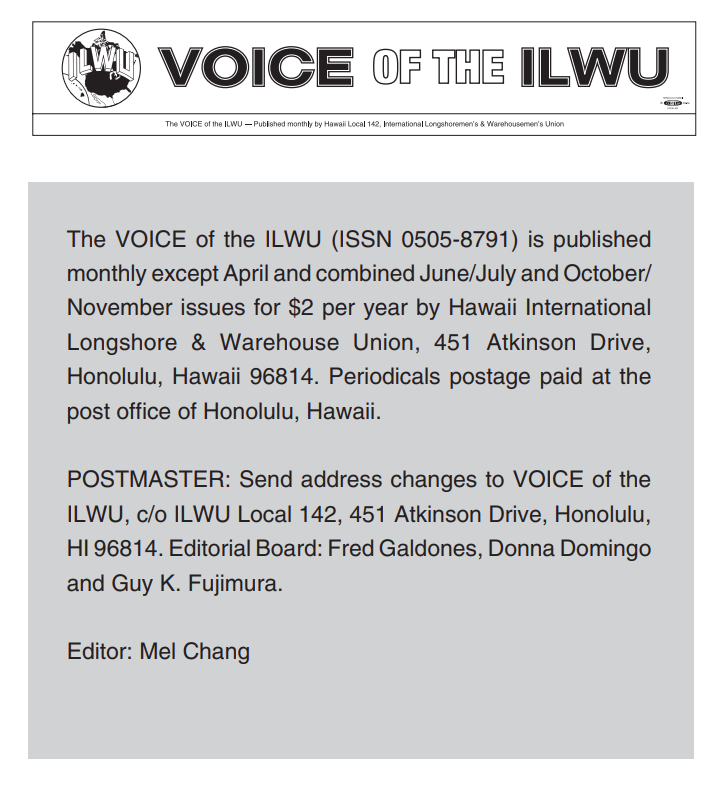The Constitution may be amended by a two-thirds vote of the Local Executive Board, subject to the approval of the majority vote of all ILWU members voting at Unit membership meetings.
At its December 14-15, 2006, meeting, the Local Executive Board approved a change in the Constitution that makes it clear that the Judicial Panel itself shall choose from its alternate members to hear cases which come out of a Division (Hawaii, Maui, Kauai, or Oahu) or when its regular members are disqualified from hearing any particular case.
The Judicial Panel is made up of five ILWU members appointed by the Local Executive Board to hear charges filed against members and officers and election challenges. They serve a term of three years and one person is appointed from each Division and one person is appointed at large. A number of alternates are also appointed at the same time. When a case before the Judicial Panel comes out of a particular Division, the panel members from that Division are replaced by their alternates.
The 2007-2009 members are: Michael Machado (Kauai), Casey Del Dotto (Maui), Eli Miura (Hawaii), Patrick DeCosta (Oahu), and Steve West (At Large).
Alternates are: Linda Fernandez, Francis Kamakaokalani (Maui); Nelson Rita (Kauai); Arnold O’Brien (Oahu); Mary “Swanee” Rillanos and Jaylene Ordonez (at large).
Following are the changes to Article XXVIII, Section 28.01 (words in brackets [ ] are new language):
ARTICLE XXVIII The Judicial Panel 28.01The ILWU shall have a Judicial Panel consisting of five (5) members all in good standing, appointed by the Local Executive Board. One (1) member will be appointed from each Division, and one (1) member appointed at large. The members shall serve a term concurrent with the terms of elected officers but remain until their replacement is named. The Local Executive Board shall also appoint two members in good standing to serve as alternate members. In the event a Division brings a challenge, the member(s) from that Division shall not sit to hear the charge. Instead the [The Judicial Panel] Local Executive Board shall designate the alternate member(s) to serve for that case. If any division member is disqualified, the [Judicial Panel] Local Executive Board shall select one of the alternates to replace the disqualified member.

The change was necessary because some cases, such as election challenges, have to be resolved quickly, and it was not practical to wait until the Local Executive Board could designate alternate members to the Judicial Panel. The change allows the Judicial Panel to select replacements, but those replacements must come from the pool of alternate members already appointed by Local Executive Board. ◆
Minimum wage increases to $7.25
Hawaii’s minimum wage increased by 50 cents on January 1, 2007, to $7.25 an hour. This was the result of Act 240, passed in 2005 by the Democratic majority in the Hawaii State Legislature. Act 240 increased the minimum from $6.25 to $6.75 in 2006, and to $7.25 in 2007. The minimum wage will stay at $7.25 an hour unless the Hawaii Legislature passes a new increase this year.
Three states—Washington, Oregon, and Vermont—provide automatic increases to their minimum wage, based on inflation as measured by the consumer price index or by averaging the increases of other wages earners. This eliminates the need to pass a new minimum wage law every few years. The minimum wage in Washington State is $7.93 an hour, the highest in the nation. It is $7.80 an hour in Oregon and $7.53 an hour in Vermont.
The federal minimum wage is $5.15 an hour, which has not changed for a record 10 years. The last time the federal minimum wage was increased was in 1996 at the urging of President Bill Clinton. Legislation sponsored by Democrats raised the minimum to $4.75 in 1996 and to $5.15 in 1997.
Since then, the Republican majority in Congress and President George Bush have repeatedly opposed attempts to increase the wages of America’s lowest paid workers. Their 10 year record of blocking the minimum wage beats the previous record of nine years held by another Republican president, Ronald Reagan. Reagan kept the minimum wage at $3.35 for nine years between 1981 and 1990.
The Democrats, who now have a majority in the US Congress, have vowed to increase the federal minimum wage to $7.25 by 2009. ◆


